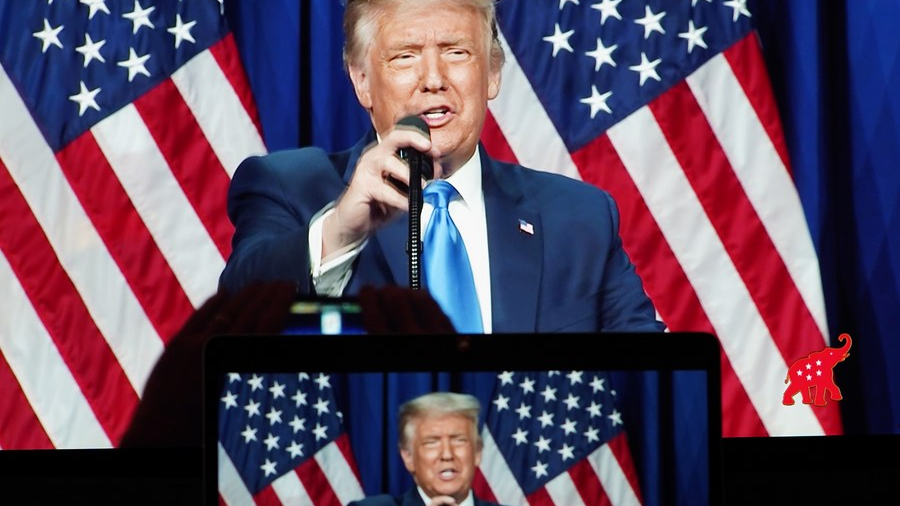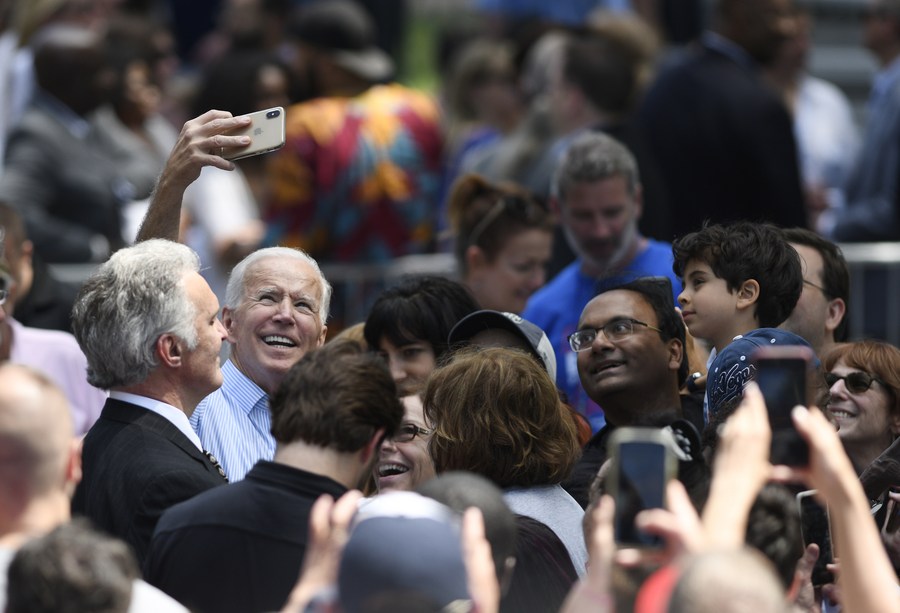
U.S. President Donald Trump speaks during the 2020 Republican National Convention in Charlotte, North Carolina, August 24, 2020. /Xinhua
U.S. President Donald Trump speaks during the 2020 Republican National Convention in Charlotte, North Carolina, August 24, 2020. /Xinhua
Editor's note: Freddie Reidy is a freelance writer based in London. He studied history and history of art at the University of Kent, Canterbury, specializing in Russian history and international politics. The article reflects the author's opinions, and not necessarily the views of CGTN.
Donald Trump closed out the Republican convention with a stark warning that a Democratic victory would mark the end of the American Dream and "demolish our cherished destiny."
The president's words echoed the equally dramatic depiction of a battle of "light and dark" used by his Democratic opponent, Joe Biden. It is no secret, that despite leading in the polls, the Democrats face their own internal battle. Can Trump exploit this and secure the "four more years" chanted by the faithful at the convention?
While Democrat congresswoman and hard-left firebrand, Alexandria Ocasio-Cortez defended her 90-second speech at the Democratic convention as a "formality," many interpreted her passionate endorsement of Bernie Sanders as a rejection of Biden's "big tent" centrist agenda. Ocasio-Cortez has previously been quoted as declaring that "in any other country Joe Biden and I would not be in the same party."
It would be a mistake to believe that Biden's centrist position is the cause for his appeal and subsequent nomination. Biden's appeal is that he is the best tool in the Democratic arsenal to remove Trump.
We know very little about Biden's policy intentions other than a likely revival of the Obama-era policies so eroded by the present administration. There is, therefore, an internal battle within the Democratic Party over future direction but events may yet dictate the victor.
The three major election themes are likely to be COVID-19, rebuilding the economy and race relations.
Many political figures awkwardly deflect from sensitive political issues, but not Trump. In his closing speech at the Republican convention, he declared the COVID-19 response a success story. The president hailed the nine million new jobs created in the last quarter – this, in spite of the U.S. having the highest death toll in the world and in spite of job losses in March hitting 22 million.
This ability to change the narrative of an issue will prove vital during the election and in potentially exploiting the schism within the Democratic Party.
There has been considerable unrest after the shooting of Jacob Blake, shot seven times in the back during an altercation with police in Wisconsin. The political response highlights the difference between Joe Biden and those on the hard left of his party, increasingly represented by Ocasio-Cortez.

Joe Biden takes a selfie with supporters during a rally in Philadelphia, Pennsylvania, U.S., May 18, 2019. /Xinhua
Joe Biden takes a selfie with supporters during a rally in Philadelphia, Pennsylvania, U.S., May 18, 2019. /Xinhua
President Trump has remained silent on the societal challenges the U.S. faces in relation to race and has instead sought to defend the police from calls to "defund" it by the Black Lives Matter organization and their supporters, Ocasio-Cortez among them. Biden's running mate Kamala Harris would fare well as a former attorney general for California, were the election to take on a "law and order" color.
If the Trump campaign can pressure the Democrats into this position, then the gulf between Biden's centrists and the hard left would widen. Biden's success depends on support from non-white working-class voters, whose support he cannot risk by moving right. Equally though, Biden's raison d'etre in 2020, is as a unifying candidate, capable of winning over wavering Republican voters, a concession to the left could also put that strategy at risk.
It would appear that the Biden campaign has placed its bet and is willing to use the threat of Trump's reelection as a whip to keep the left in line.
It was notable at the Democratic convention that more time was allotted to "converts" such as General Colin Powell and John Kasich than was afforded to Bernie Sanders or Ocasio-Cortez, demonstrating a commitment to a "broad church" appeal.
In 2016, Hillary Clinton was hampered by not receiving the full support of Sanders' supporters; Trump will hope to replicate this trend by time and again forcing Biden to compromise and forge a middle path. The majority of Democrat activist support does not presently lie in the center and increasingly centrist policies would further alienate the Democratic base.
Another illustrative flashpoint is in the Massachusetts Democratic Senate primary where House Speaker Nancy Pelosi endorsed Joe Kennedy III against progressive incumbent, Ed Markey. The move again underscores a belief that the path to power is achieved through moderate candidates with a broader appeal rather than one backed by an ideological movement.
A strategy to split the Democrats and move Biden further to the center is not without risk though. Trump will need to continue to press the idea that a Biden presidency would lead to unbridled socialism, ironically a prospect Biden's left flank would gladly embrace.
(If you want to contribute and have specific expertise, please contact us at opinions@cgtn.com.)